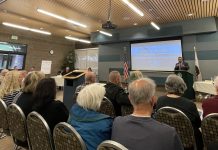As some of you may know, a mailer was sent to Cypress households last week highlighting the candidates who were officially endorsed by the Cypress Police Officers Association (CPOA). Upon seeing this mailer, which featured me among the other endorsed candidates, I initially thought that it was sent out by the CPOA and really didn’t think much about it. However, it was brought to my attention that this mailer, and now a series of subsequent mailers, were paid for by a group called Safe Neighborhoods PAC. Until this was brought to my attention, I had never heard of or been contacted by this PAC.
This type of spending is an example of an “independent expenditure,” which is money that is spent supporting or opposing candidates or measures, but not made to or at the request of the affected candidate or measure committee. Essentially this is money spent during an election that the candidate does not control or know about, and it is not subject to contribution limits.
I have previously said that I did not want any independent expenditures spent on my behalf. My opinion on that has not changed. As a candidate, I would rather have individuals and organizations donate directly to my campaign. It is the simplest and most transparent way to fund my candidacy. That way, I know who is contributing and how the money is being spent, and I can accept or decline the donations. With an independent expenditure, I have no knowledge of or control over who is spending the money or how the money is spent.
Since one of the priorities of my candidacy is transparency and accountability, I’ve taken some time to research this PAC, so that I can personally know who is funding it and be as transparent as possible. A Form 496 filed with the City of Cypress shows that Safe Neighborhoods PAC (FPPC ID 1450946) made an independent expenditure totaling $3,768 in support of Terry Miller—my assumption is that this expenditure paid for the mailers that highlighted my candidacy. Based on its most recent Form 460, Safe Neighborhoods PAC has received $96,900 in contributions this year, with its largest contribution coming from the Orange County Taxpayers Association PAC ($49,750). In addition, the PAC received a contribution of $22,000 from Grand Central Recycling & Transfer Station on October 27. Further research shows that Grand Central Recycling & Transfer Station is a transfer and processing facility operated by Valley Vista Services. A Form 497 filed on October 24 shows a donation from a real estate investor, Chris Bardis, to the PAC for $15,000.
For those who don’t know, Valley Vista Services (VVS) contracts with the City of Cypress for trash and recycling collection. In addition, an opinion piece in the Event-News Enterprise states that Mr. Bardis is a partner in the Los Alamitos Race Track and a real estate developer in Cypress. Until I read that article, I had never heard of or met Mr. Bardis. Based on this information, it appears that VVS and Mr. Bardis have contributed towards an independent expenditure in support of my candidacy through Safe Neighborhoods PAC. If VVS or Mr. Bardis had offered contributions directly to my campaign, I would have had the option to vet each of them and either accept the contribution and disclose it publicly, or respectfully decline as to avoid the appearance of a conflict of interest. As your council member, I will disclose this—or any other potential conflict I am aware of—and consider abstaining from a vote, if any business concerning VVS or Mr. Bardis was to come before the council.
This Safe Neighborhoods PAC issue illustrates why I prefer direct contributions to my campaign, as well as a broader point about contribution limits and independent expenditures. California has a $4,900 contribution limit for city elections, when the city has not already enacted a contribution limit. I think that amount is reasonable. Cities can enact contribution limits that are lower or higher than the state-set limit or enact no contribution limits for their elections. I have spoken to people who want Cypress to set a contribution limit of $1,000 or lower. My concern is that if the limit is set too low, it may incentivize more independent expenditures for elections in our city.
The unfortunate fact is that getting elected to most political offices requires money—money for signs, literature, direct mail, door knocking, phone calls, texting, digital and print ads, etc. In Cypress, it requires money to reach out to a significant portion of the approximately 30,000 voters in the city. In fact, sending one direct mail piece to just the “likely voters” in Cypress can cost $5,000 or more. Lowering contribution limits is not the panacea many would have you think it is. While doing so may reduce the money a candidate can raise from individuals or organizations, or the overall amount of money a candidate raises, it will likely have no effect on the total amount spent on an election. The donations will likely just shift more towards independent expenditures, which are not subject to contribution limits.
While I agree with the desire to limit corruption and the influence of money in government, I think there are more effective ways to do it. One solution is SB-1439, bipartisan legislation that was signed by the Governor, which prohibits political contributions over $250 to local elected officials who make contracting decisions from parties seeking contracts with local governments. That type of legislation combined with easily-accessible campaign finance disclosures (for both candidate-controlled and independent expenditure committees) are a good starting point for limiting and disclosing conflicts of interest.
Terry Miller
Candidate for Cypress City Council












